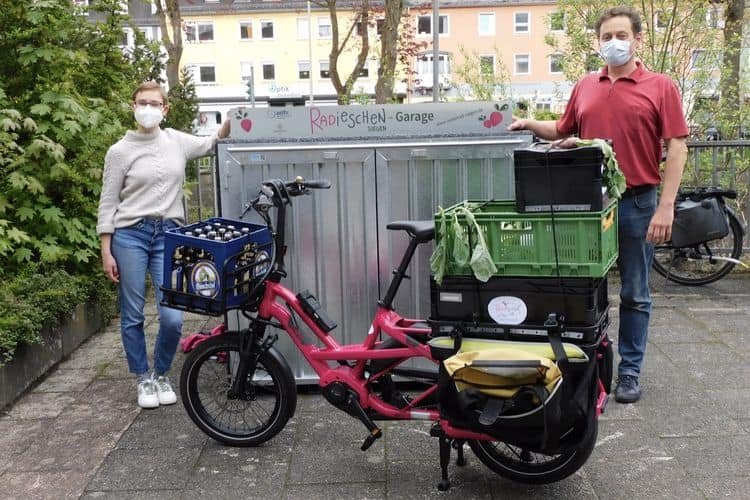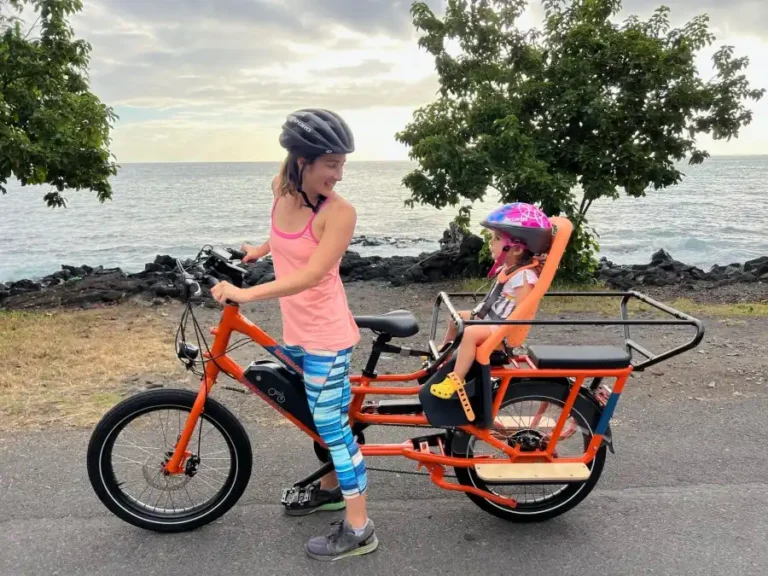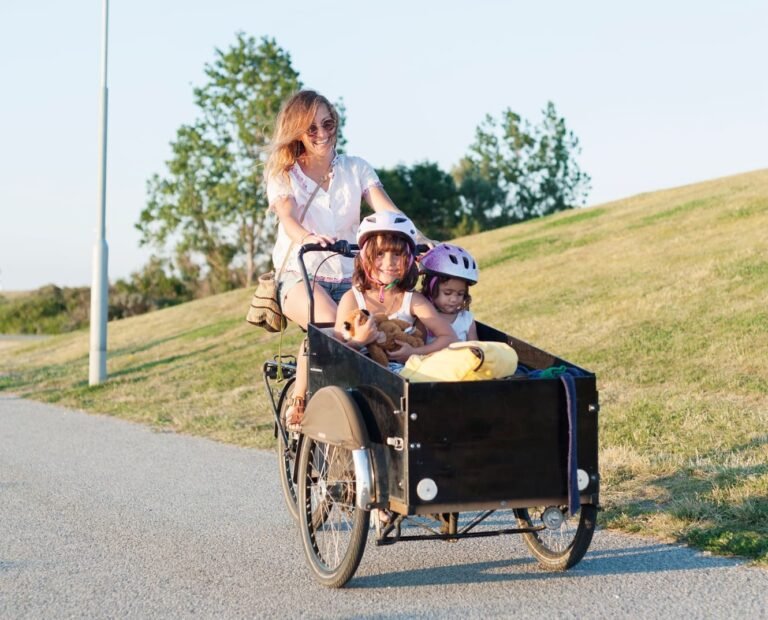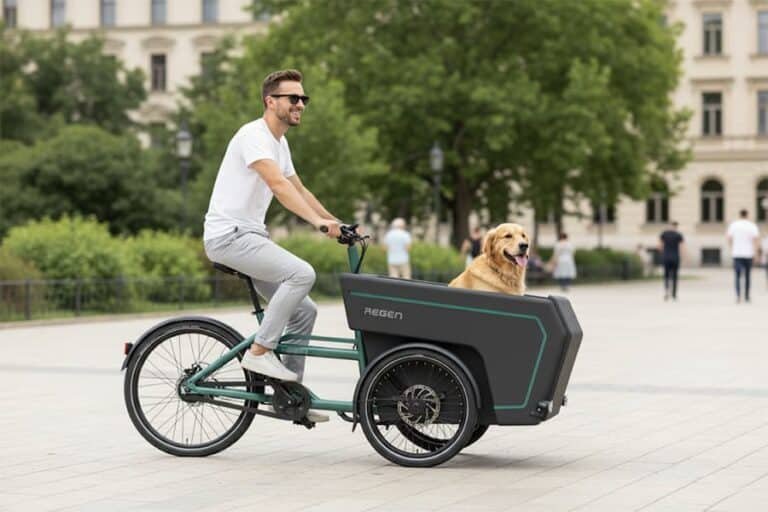Washington, D.C., luglio 2025 - Il Dipartimento dei Trasporti del Distretto (DDOT) ha dato il via a un innovativo programma pilota della durata di 12 mesi volto a spostare le consegne di cibo tramite app dai veicoli a gas alle biciclette elettriche (e-bike). Sostenuta da una coalizione che comprende il Los Angeles Cleantech Incubator (LACI), Whizz e PopWheels, l'iniziativa mira a ridurre le emissioni di anidride carbonica, alleggerire la congestione del traffico, aumentare la sicurezza stradale e fornire un sostegno economico agli addetti alle consegne.
Il programma pilota, il cui lancio è previsto per metà luglio 2025, si svolgerà in due fasi di sei mesi, ciascuna delle quali coinvolgerà un gruppo selezionato di addetti alle consegne che riceveranno biciclette elettriche sovvenzionate e l'accesso all'infrastruttura di scambio delle batterie. La prima coorte è già in fase di selezione e i partecipanti potranno acquistare le loro biciclette elettriche al termine del programma.
1. Panoramica e obiettivi del pilota
Il pilota di biciclette elettriche è stato annunciato formalmente il 30 giugno 2025 dal direttore del DDOT Sharon Kershbaum, sottolineando l'impegno della città a raggiungere la neutralità del carbonio e la resilienza climatica entro il 2045.
"Questo pilota sta testando una delle tante strategie per raggiungere i nostri obiettivi climatici, migliorando al contempo la sicurezza stradale, riducendo la congestione del traffico e sostenendo la forza lavoro locale", ha dichiarato il direttore Kershbaum.
Finanziata dalla LACI's City Climate Innovation Challenge, l'iniziativa fornirà sia i veicoli che le infrastrutture necessarie per una distribuzione di successo in due fasi di sei mesi.
2. Organizzazione partecipantes
- DDOT - Assemblaggio del progetto, integrazione della strada e valutazione continua.
- LACI - Sostegno finanziario attraverso il City Climate Innovation Challenge .
- Whizz - Fornitore di biciclette elettriche a pedalata assistita Whizz Storm 2 e dei relativi accessori.
- PopWheels - Responsabile dell'installazione e della manutenzione degli armadietti di scambio delle batterie.
Per supportare i partecipanti al progetto pilota, PopWheels ha creato stazioni di scambio delle batterie nei punti nevralgici della comunità:
- Il Festival Center (1640 Columbia Rd NW, Adams Morgan)
- Chiesa presbiteriana di Westminster (400 I St SW, Southwest Waterfront)
Ogni armadietto può contenere fino a 16 batterie, offrendo una sostituzione rapida e semplice esclusivamente ai partecipanti al pilota.
3. Struttura del programma e benefici per il pilota
Il progetto pilota prevede due coorti consecutive di sei mesi:
- Fase uno: Lancio a metà luglio 2025.
- Fase due: Segue immediatamente e continua fino alla metà del 2026.
Ogni pilota riceverà una e-bike Whizz Storm 2 fortemente sovvenzionata, l'attrezzatura, il casco e l'accesso prioritario alle strutture di scambio delle batterie. È importante notare che i piloti hanno la possibilità di acquistare le loro biciclette elettriche dopo aver completato ogni fase.
L'obiettivo non è solo quello di incoraggiare la partecipazione, ma anche di sostenere il possesso a lungo termine, trasformando i ciclisti in sostenitori della logistica verde.
4. Affrontare le sfide urbane
Riduzione delle emissioni
Sostituendo i ciclomotori e i furgoni a gas con biciclette elettriche a pedalata assistita, la città mira a ridurre le emissioni legate alle consegne e a progredire verso l'obiettivo climatico del 2045.
Traffico e congestione dei marciapiedi
I veicoli per le consegne, soprattutto quelli in doppia fila o che occupano le piste ciclabili, pongono gravi problemi. La congestione dei marciapiedi è diventata un problema importante dopo l'era della pandemia, spingendo D.C. a esplorare la tariffazione dinamica dei marciapiedi e le soluzioni di microconsegna.
Miglioramento della sicurezza
Il direttore del DDOT Kershbaum ha anche espresso l'obiettivo di eliminare dalle strade i pericolosi ciclomotori, che spesso confondono i confini tra le piste ciclabili e le zone pedonali.
Supporto ai lavoratori
Le elevate sovvenzioni rendono le biciclette elettriche accessibili. Il possesso post-pilota consente ai ciclisti di acquisire un capitale proprio nel trasporto verde a basso costo e di passare dalle alternative a gas.
5. Il pilota nel contesto: Lezioni da altre città
Washington non è la prima a esplorare modelli di erogazione sostenibili:
- New York e Portland stanno creando zone di consegna senza emissioni e spostando la consegna delle merci su biciclette elettriche per ridurre il traffico dei camion.
- Londra e Parigi hanno ampliato l'uso di biciclette elettriche cargo per la distribuzione di posta e generi alimentari.
- Seattle ha rilevato che una e-cargo bike potrebbe sostituire oltre 1,4 veicoli per le consegne di produttività equivalente.
- Dati di DoorDash mostra che oltre 50% di consegne a Washington utilizzano già modalità a due ruote come biciclette, biciclette elettriche e scooter - triplicando dal 2022 - offrendo vantaggi come guadagni più elevati e servizi più rapidi.
6. Infrastrutture e innovazioni per le aree urbane
Il progetto pilota di DDOT per le biciclette elettriche integra i progetti pilota in corso sui marciapiedi. Questi includono la tariffazione dinamica dei marciapiedi tramite telecamere montate su pali e zone di carico a breve termine progettate per il prelievo/rilascio, riducendo i parcheggi in doppia fila e migliorando la rotazione.
I progetti includono:
- Autorizzazione all'uso dei marciapiedi con sistemi di lettura delle targhe, sperimentati a Pittsburgh e Boston, che hanno portato a una riduzione dei parcheggi in doppia fila.
- Testare veicoli cargo a pedalata assistita nel corso dell'anno per le consegne più grandi, seguendo i modelli di New York City.
- Introduzione di hub per la micromobilità, tra cui biciclette elettriche e stazioni per lo scambio di batterie, nei corridoi ad alta densità di negozi e ristoranti.
7. Monitoraggio del successo: Piani di valutazione
Nel corso dell'anno, DDOT e LACI raccoglieranno dati su una serie di indicatori di performance, tra cui:
- Efficienza e portata delle consegne
- Emissioni di carbonio risparmiate
- Modifiche alla congestione del traffico e dei marciapiedi
- Esiti della sicurezza (ad esempio, incidenti, quasi incidenti)
- Feedback dei piloti e impatto economico
Una valutazione formale al termine del progetto pilota determinerà se il programma debba essere esteso a tutta la città o ad altri tipi di consegna (ad esempio, pacchi, generi alimentari).
8. Reazione del fattorinon
I resoconti locali, tra cui WUSA9 e le discussioni su Reddit, mostrano un forte interesse da parte degli addetti alle consegne. Un utente di Redditor di r/washingtondc ha dichiarato:
"DC sta conducendo un programma pilota di sei mesi in cui dà a trenta persone l'accesso a una e-bike e a tutta l'attrezzatura necessaria per consegnare cibo a un prezzo scontato ($29/mese). Sono stato selezionato come uno dei trenta".
WUSA9 osserva inoltre che i partecipanti pagano solo $29/mese e ricevono un'assistenza completa per le attrezzature durante il progetto pilota.
Queste risposte dimostrano che i motociclisti vedono le biciclette elettriche come alternative più sicure ed economiche ai ciclomotori e agli scooter.
9. Verso un futuro logistico sostenibile
Il programma pilota di Washington evidenzia un ampio cambiamento strategico:
- Transizione del veicolo - dai ciclomotori a gas alle biciclette elettriche.
- Gestione delle aree urbane - attraverso la tariffazione dinamica e le zone a breve termine.
- Scalabilità dell'infrastruttura - con armadietti per lo scambio di batterie e modelli hub.
- Politiche basate sui dati - informare la regolamentazione e l'espansione a lungo termine.
Se si dimostrerà efficace, il modello di D.C. potrebbe estendersi a un uso più ampio, con un maggior numero di stazioni di scambio di batterie, partnership per la consegna e incentivi graduali per la logistica pulita.
Conclusione
Con le crescenti pressioni sulle consegne e le preoccupazioni per la sicurezza stradale, il progetto pilota di Washington D.C. per le consegne di cibo con le biciclette elettriche stabilisce uno standard nazionale per le politiche di micromobilità sostenibile. Integrando tecnologia verde, gestione dei marciapiedi e responsabilizzazione dei lavoratori, il Distretto sta gettando le basi per una logistica urbana moderna, intelligente e pulita. L'anno prossimo sarà cruciale: il successo di questa iniziativa potrebbe trasformare il modo in cui le città gestiscono le consegne dell'ultimo miglio.
Riferimenti
- Comunicato stampa DDOT, "DDOT sostiene una consegna di cibo più pulita e sicura con un nuovo pilota di consegna di cibo in bicicletta", 30 giugno 2025.
- Planetizen, "DC lancerà un pilota per la consegna di biciclette elettriche", 7 luglio 2025
- WUSA9, "Un nuovo programma pilota prevede l'impiego di biciclette elettriche per gli autisti delle consegne a Washington", inizio luglio 2025.
- Washington Post (Tecnologia e trasporti), "Le app di consegna hanno distrutto le nostre strade. Una nuova tecnologia potrebbe risolvere il problema", 13 luglio 2025.
- Fox 5 DC, "I leader di Washington lavorano su piani per alleviare la congestione del traffico in tutta la città", 15 luglio 2025.
- Reddit (r/washingtondc), rapporto degli utenti sull'adesione al pilota di e-bike, luglio 2025
- Planetizen e il servizio di WUSA sui dettagli della stazione di scambio delle batterie
- Comunicati di Planetizen e DDOT sulle partnership con Whizz e PopWheels
- Axios (notizia): "Gli hotspot americani della consegna in bicicletta" sulla crescita delle consegne su due ruote






